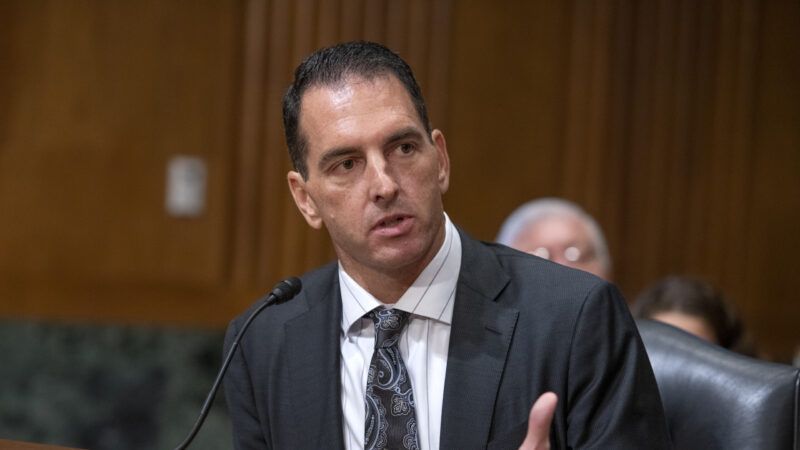The PPP Was a COVID-Era Disaster. Trump Wants To Promote the Guy Who Ran It.
After overseeing the pandemic-era Paycheck Protection Program (PPP), which was a bloated, wasteful mess, Michael Faulkender is failing up.

The pandemic-era Paycheck Protection Program (PPP) was a bloated, wasteful mess—and now the guy responsible for running it is getting a promotion.
President-elect Donald Trump announced Wednesday that he'd nominated Michael Faulkender to be his deputy Treasury Secretary, effectively the second-in-command position at one of the federal government's most vital departments. Faulkender is a professor of finance at the University of Maryland's business school and serves as chief economist for the America First Policy Institute, a pro-Trump think tank founded in 2021.
"Mike is a distinguished economist and policy practitioner who will drive our America-first agenda," Trump posted on Truth Social.
Faulkender was the assistant secretary for economic policy at the Treasury Department during the first Trump administration, and it was in that role that he oversaw the PPP, a stimulus program that ultimately distributed more than $800 billion.
That money was supposed to go to businesses that had been shuttered by the pandemic (or by various governmental edicts), and it was supposed to keep furloughed workers on the payroll until reopening. In fairness, at least some of the PPP's budget was used for that purpose, but we now know that much—maybe even most—of the PPP funds ended up being wasted or stolen.
"Only 23 to 34 percent of the program's funds went directly to workers who would have otherwise lost their jobs," a National Bureau of Economic Research study found. Another study by the Federal Reserve Bank of St. Louis found that taxpayers paid roughly $4 for every $1 of wages and benefits to workers.
Some of the PPP's funds likely ended up in the pockets of business owners rather than funding workers' paychecks, a New York Times investigation concluded. A lot of it was simply stolen—so much, in fact, that the Government Accountability Office (GAO) says a full accounting of the losses "will never be known with certainty."
Any massive, rapidly assembled stimulus program that's under orders from Congress to spend money first and ask questions later is going to be ripe for fraud, of course. Still, the overwhelming size of the PPP's losses points to mismanagement as a significant factor.
Both internal and external reviews of the PPP's losses have come to that conclusion. A 2022 audit published by the Small Business Administration's inspector general pointed out that the agency, which handled the PPP applications and distributed the cash, did not have "a centralized entity to design, lead, and manage fraud risk" until February 2022—nearly two years after the PPP loans began being distributed and long after the bulk of them had been forgiven.
Meanwhile, a comprehensive review of the PPP published by the Project on Government Oversight (POGO), a nonprofit watchdog group, found that millions of PPP loans were flagged as being suspicious but most were never investigated. That's despite then-Treasury Secretary Steven Mnuchin promising in April 2020 that all PPP loans would be subject to a "full review."
Perhaps the most damning detail in the POGO report is the fact that 40 percent of the "flags" attached to suspicious loans were "cleared" in January 2021, as the Trump administration was coming to a close. That includes 99 percent of the flags attached to roughly 28,000 loans that exceeded $2 million. As the group suggests in its report, the "bulk closure" of those flags suggests a last-minute attempt at superficial due diligence.
All of this points directly back to Faulkender. He won't have to endure a Senate confirmation hearing before taking up his deputy secretary post, and that's a shame because he ought to be grilled. Why did the PPP program fail to anticipate or respond to widespread fraud? Did he order the mass clearance of the flagged loans? If he didn't, who was actually running the PPP?
There are no good answers here, as Faulkender was either asleep at his post or actively complicit in what one former U.S. attorney has called it "the biggest fraud in a generation."
In a paper he coauthored earlier this year, Faulkender attempted to defend the PPP's track record. The program saved 13.8 million jobs "at an average cost of approximately $33,200 to $37,600 per job saved," he wrote. (But that math doesn't quite add up: at those figures, the PPP would have cost taxpayers around $500 million rather than the $800 billion that was actually spent.)
This isn't the first Trump pick to have some unseemly COVID-era baggage. Chad Chronister, the Florida sheriff who was Trump's first pick to run the Drug Enforcement Administration (DEA), withdrew from the position after facing criticism for aggressively enforcing social-distancing rules during the pandemic—including the arrest of a pastor who held a church service in defiance of lockdown rules.
Holding public officials accountable for their lack of judgment and poor management during the pandemic is essential to restoring trust in government and other institutions. Faulkender's failures may not be as directly egregious as Chronister's, but Trump is making a mistake by allowing him to fail upward at the Treasury Department.


Show Comments (26)